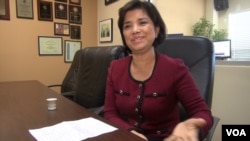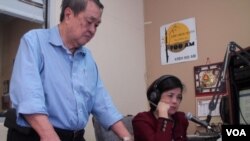“You come up with a question and I will tell you when to listen, at what time and what day to listen,” Radio Saigon Houston host Vu Thanh Thuy tells her listeners. Her voice is familiar to many Vietnamese in the United States.
In a midday program this week, she spoke on the air with a co-host in Dallas as listeners called in to discuss everything from family life and politics to events in their homeland. “This morning our station did an interview with a priest in Vietnam who was leading a group of 18,000 protesters in Central Vietnam against the pollution,” Vu Thanh Thuy said, illustrating the reach of her program.
Many of her listeners, she said, have a keen interest in what happens in Vietnam and are especially concerned over Chinese claims to Vietnamese territory.
Houston now has the largest community of Vietnamese in the U.S. outside the state of California. Some Vietnamese stations in other parts of the United States also run the program, and there also are listeners in Vietnam who can hear it on the internet.
Thriving community
The Vietnamese-language radio station is located on Houston’s Bellaire Boulevard, in an area where even street signs are in Vietnamese. Nearby is a large Vietnamese Buddhist pagoda, along with a Vietnamese Catholic church. The shopping center where Radio Saigon Houston has its studios is full of Vietnamese restaurants, tea shops, bakeries and health food stores.
Many of the people in these establishments speak only Vietnamese. For some who arrived from Vietnam recently, as well as for many who have been in the U.S. for decades, this zone is a place of comfort that exists within the diverse landscape of the nation's fourth-largest city.
Vu Thanh Thuy said the station can help people who grew up in Vietnam adjust to life in Houston. She said, "I like to find ways for my community to adjust better to the new life."
The Vietnamese community in Houston began with refugees who fled their country after the communist takeover of Saigon in 1975, then grew as subsequent waves of immigrants arrived. In the 1980's, many Vietnamese fled communist rule by taking to the South China Sea. They were known as the “boat people.”
After living in refugee centers in other Southeast Asian nations, thousands came to the United States. More recently, Vietnamese who have relatives in the U.S. have obtained visas through a family reunification program. These separate waves of immigrants have infused the Houston community with fresh connections to the language and culture of their homeland, and in turn, that has enhanced the value of the radio station.
“To me the radio station is a way to help the latecomers to catch up with the ones who came before them,” says Vu Thanh Thuy.
Journalists in business
She and her husband, Duong Phuc, were journalists in Vietnam. She later became a reporter for the San Diego Union newspaper, now known as The San Diego Union-Tribune since a 1992 merger. The couple bought the station in Houston with the idea of continuing their journalist vocation.
A broadcast station, however, also is a business, and it relies on revenue from advertising from local establishments and national brands. Vu Thanh Thuy says the station as well as the many Vietnamese businesses advertising on it have prospered in the U.S. free enterprise system in a way that would have been difficult in Vietnam.
“If you were born rich [in Vietnam] then you would have a better life, and if you were born poor, well, that is it for you, but in America this is really the land of opportunity,” says Vu Thanh Thuy.
One issue she and her husband confronted was figuring out the size of the potential audience. Advertisers usually want to know how many listeners will potentially hear their commercial announcements. Estimates of the size of Houston’s Vietnamese community range from 150,000 to as many as 300,000.
"A lot of Vietnamese did not fill out their census papers because we come from a country that has no trust of the authorities," she observes.
Another challenge is maintaining an audience for Vietnamese broadcasts among younger people, who often prefer to communicate in English. Vu Thanh Thuy remains optimistic.
"The young people’s mind changes with time, especially when they have children. They want their children to be bilingual. It is always better to have more than one language.”
She says the station has attracted some younger listeners through youth-oriented programs in which hosts speak both Vietnamese and English.







